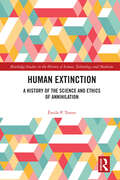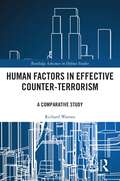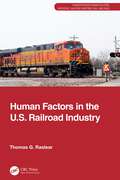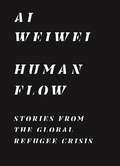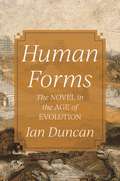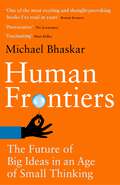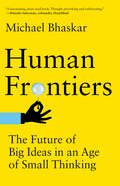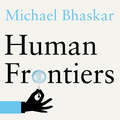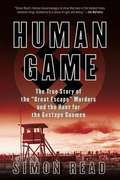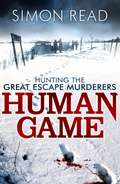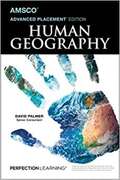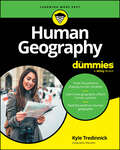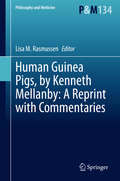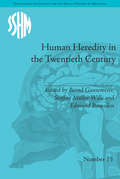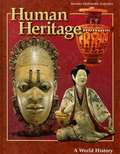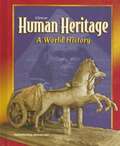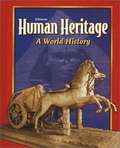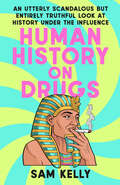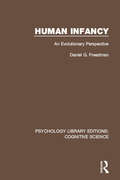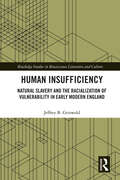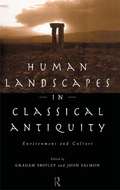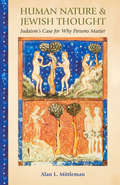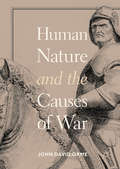- Table View
- List View
Human Extinction: A History of the Science and Ethics of Annihilation (Routledge Studies in the History of Science, Technology and Medicine)
by Émile P. TorresThis volume traces the origins and evolution of the idea of human extinction, from the ancient Presocratics through contemporary work on "existential risks." Many leading intellectuals agree that the risk of human extinction this century may be higher than at any point in our 300,000-year history as a species. This book provides insight on the key questions that inform this discussion, including when humans began to worry about their own extinction and how the debate has changed over time. It establishes a new theoretical foundation for thinking about the ethics of our extinction, arguing that extinction would be very bad under most circumstances, although the outcome might be, on balance, good. Throughout the book, graphs, tables, and images further illustrate how human choices and attitudes about extinction have evolved in Western history. In its thorough examination of humanity’s past, this book also provides a starting point for understanding our future. Although accessible enough to be read by undergraduates, Human Extinction contains new and thought-provoking research that will benefit even established academic philosophers and historians.
Human Factors in Effective Counter-Terrorism: A Comparative Study (Routledge Advances in Defence Studies)
by Richard WarnesThis book seeks to provide a comparative assessment of the significance of ‘human factors’ in effective counter-terrorism. The phrase ‘human factors’ is used to describe personal relationships, individual capabilities, effective leadership, technical interface, organisational culture and the community engagement necessary to effectively minimise, counter and control the threat of terrorism. Unlike many works in the field, this book is constructed around the input of ‘experienced knowledge’ from over 170 semi-structured interviews of specialist military, policing, intelligence and security practitioners - those actors actually involved in countering terrorism. These practitioners come from seven countries – the United Kingdom, Ireland, France, Spain, Israel, Turkey and the United States – all of which have suffered over the years from different types of terrorist threat and responded with a mixture of counter-terrorist measures. Where military practitioners also discussed overseas counter-insurgency measures, that material has been included, since terrorism forms a key aspect of such wider insurgencies. The resulting interview data was analysed through a variant of ‘Grounded Theory’ to identify key emerging themes and issues, both positive and negative, relevant to ‘human factors’ in the individual countries and more generically. This book incorporates the informed operational experiences and insights of the interviewees while seeking to provide examples of successful counter-terrorist measures at the strategic, operational and tactical levels. This book will be of much interest to students of counter-terrorism, defence studies and security studies in general.
Human Factors in the U.S. Railroad Industry (Transportation Human Factors)
by Thomas G. RaslearAt the heart of the U.S. Railroad Industry are human operators who continue to make it work and operate. However, humans are susceptible to error, fatigue, and risky behaviors. Understanding how these impact the safety of the industry remains a crucial topic to be studied. Human Factors in the U.S. Railroad Industry investigates the human factor behind one of the world’s biggest railway networks and synthesizes the body of research that has been produced by the Federal Railroad Administration (FRA) on Human Factors in the Railroad industry since 1993.During that time, over 120 FRA reports were published on topics such as accident analysis, grade crossing safety and trespassing, working conditions and ergonomics, employee fatigue, safety culture, and track inspection. This book organizes this body of work into topic areas that correspond to Moray’s Sociotechnical System (2006) to provide a comprehensive way to understand the relationship between policy, organizational culture, and system safety. It discusses tools such as risk exposure, signal detection theory, and program evaluation that have been applied to railroad projects and can be used to improve future railroad and transportation research. It provides a synthesis of the reports across topic areas such as fatigue, ergonomics, and safety culture that are currently important within the wider human factors transportation research community. The reader will develop an understanding of a “human-centered systems” approach to the railroad industry, which focuses on human capabilities and limitations with respect to human/system interfaces, operations, system integration, and organizational influences on safety.Human Factors in the U.S. Railroad Industry will appeal to researchers, academics, students, and professionals interested in human factors, railway engineering, civil engineering, and industrial engineering.
Human Flow: Stories from the Global Refugee Crisis
by Weiwei AiA powerful portrait of the greatest humanitarian emergency of our time, from the director of Human FlowIn the course of making Human Flow, his epic feature documentary about the global refugee crisis, the artist Ai Weiwei and his collaborators interviewed more than 600 refugees, aid workers, politicians, activists, doctors, and local authorities in twenty-three countries around the world. A handful of those interviews were included in the film. This book presents one hundred of these conversations in their entirety, providing compelling first-person stories of the lives of those affected by the crisis and those on the front lines of working to address its immense challenges.Speaking in their own words, refugees give voice to their experiences of migrating across borders, living in refugee camps, and struggling to rebuild their lives in unfamiliar and uncertain surroundings. They talk about the dire circumstances that drove them to migrate, whether war, famine, or persecution; and their hopes and fears for the future. A wide range of related voices provides context for the historical evolution of this crisis, the challenges for regions and states, and the options for moving forward.Complete with photographs taken by Ai Weiwei while filming Human Flow, this book provides a powerful, personal, and moving account of the most urgent humanitarian crisis of our time.
Human Forms: The Novel in the Age of Evolution
by Ian DuncanA major rethinking of the European novel and its relationship to early evolutionary scienceThe 120 years between Henry Fielding's Tom Jones (1749) and George Eliot's Middlemarch (1871) marked both the rise of the novel and the shift from the presumption of a stable, universal human nature to one that changes over time. In Human Forms, Ian Duncan reorients our understanding of the novel's formation during its cultural ascendancy, arguing that fiction produced new knowledge in a period characterized by the interplay between literary and scientific discourses—even as the two were separating into distinct domains.Duncan focuses on several crisis points: the contentious formation of a natural history of the human species in the late Enlightenment; the emergence of new genres such as the Romantic bildungsroman; historical novels by Walter Scott and Victor Hugo that confronted the dissolution of the idea of a fixed human nature; Charles Dickens's transformist aesthetic and its challenge to Victorian realism; and George Eliot's reckoning with the nineteenth-century revolutions in the human and natural sciences. Modeling the modern scientific conception of a developmental human nature, the novel became a major experimental instrument for managing the new set of divisions—between nature and history, individual and species, human and biological life—that replaced the ancient schism between animal body and immortal soul.The first book to explore the interaction of European fiction with "the natural history of man" from the late Enlightenment through the mid-Victorian era, Human Forms sets a new standard for work on natural history and the novel.
Human Frontiers: The Future of Big Ideas in an Age of Small Thinking
by Michael Bhaskar'A fascinating, must-read book covering a vast array of topics from the arts to the sciences, technology to policy. This is a brilliant and thought-provoking response to one of the most critical questions of our age: how we will come up with the next generation of innovation and truly fresh ideas?'Mustafa Suleyman, cofounder of DeepMind and Google VP'Have "big ideas" and big social and economic changes disappeared from the scene? Michael Bhaskar's Human Frontiers is the best look at these all-important questions.'Tyler Cowen, author of The Great Stagnation and The Complacent Class'Michael Bhaskar explores the disturbing possibility that a complacent, cautious civilization has lost ambition and is slowly sinking into technological stagnation rather than accelerating into a magical future. He is calling for bold, adventurous innovators to go big again. A fascinating book'Matt Ridley, author of How Innovation WorksWhere next for humanity? Is our future one of endless improvement in all areas of life, from technology and travel to medicine, movies and music? Or are our best years behind us? It's easy to assume that the story of modern society is one of consistent, radical progress, but this is no longer true: more academics are researching than ever before but their work leads to fewer breakthroughs; innovation is incremental, limited to the digital sphere; the much-vaunted cure for cancer remains elusive; space travel has stalled since the heady era of the moonshot; politics is stuck in a rut, and the creative industries seem trapped in an ongoing cycle of rehashing genres and classics. The most ambitious ideas now struggle. Our great-great-great grandparents saw a series of transformative ideas revolutionise almost everything in just a few decades. Today, in contrast, short termism, risk aversion, and fractious decision making leaves the landscape timid and unimaginative.In Human Frontiers, Michael Bhaskar draws a vividly entertaining and expansive portrait of humanity's relationship with big ideas. He argues that stasis at the frontier is the result of having already pushed so far, taken easy wins and started to hit limits. But new thinking is still possible. By adopting bold global approaches, deploying cutting edge technology like AI and embracing a culture of change, we can push through and expand afresh.Perfect for anyone who has wondered why we haven't gone further, this book shows in fascinating detail how the 21st century could stall - or be the most revolutionary time in human history.
Human Frontiers: The Future of Big Ideas in an Age of Small Thinking
by Michael BhaskarWhy has the flow of big, world-changing ideas slowed down? A provocative look at what happens next at the frontiers of human knowledge.The history of humanity is the history of big ideas that expand our frontiers—from the wheel to space flight, cave painting to the massively multiplayer game, monotheistic religion to quantum theory. And yet for the past few decades, apart from a rush of new gadgets and the explosion of digital technology, world-changing ideas have been harder to come by. Since the 1970s, big ideas have happened incrementally—recycled, focused in narrow bands of innovation. In this provocative book, Michael Bhaskar looks at why the flow of big, world-changing ideas has slowed, and what this means for the future.Bhaskar argues that the challenge at the frontiers of knowledge has arisen not because we are unimaginative and bad at realizing big ideas but because we have already pushed so far. If we compare the world of our great-great-great-grandparents to ours today, we can see how a series of transformative ideas revolutionized almost everything in just a century and a half. But recently, because of short-termism, risk aversion, and fractious decision making, we have built a cautious, unimaginative world. Bhaskar shows how we can start to expand the frontier again by thinking big—embarking on the next Universal Declaration of Human Rightsor Apollo mission—and embracing change.
Human Frontiers: The Future of Big Ideas in an Age of Small Thinking
by Michael Bhaskar'A fascinating book . . . Bhaskar is a reassuringly positive and often witty guide'Observer'A fascinating, must-read book covering a vast array of topics from the arts to the sciences, technology to policy. This is a brilliant and thought-provoking response to one of the most critical questions of our age: how we will come up with the next generation of innovation and truly fresh ideas?'Mustafa Suleyman, cofounder of DeepMind and Google VP'Have "big ideas" and big social and economic changes disappeared from the scene? Michael Bhaskar's Human Frontiers is the best look at these all-important questions.'Tyler Cowen, author of The Great Stagnation and The Complacent Class'Michael Bhaskar explores the disturbing possibility that a complacent, cautious civilization has lost ambition and is slowly sinking into technological stagnation rather than accelerating into a magical future. He is calling for bold, adventurous innovators to go big again. A fascinating book'Matt Ridley, author of How Innovation WorksWhere next for humanity? Is our future one of endless improvement in all areas of life, from technology and travel to medicine, movies and music? Or are our best years behind us? It's easy to assume that the story of modern society is one of consistent, radical progress, but this is no longer true: more academics are researching than ever before but their work leads to fewer breakthroughs; innovation is incremental, limited to the digital sphere; the much-vaunted cure for cancer remains elusive; space travel has stalled since the heady era of the moonshot; politics is stuck in a rut, and the creative industries seem trapped in an ongoing cycle of rehashing genres and classics. The most ambitious ideas now struggle. Our great-great-great grandparents saw a series of transformative ideas revolutionise almost everything in just a few decades. Today, in contrast, short termism, risk aversion, and fractious decision making leaves the landscape timid and unimaginative.In Human Frontiers, Michael Bhaskar draws a vividly entertaining and expansive portrait of humanity's relationship with big ideas. He argues that stasis at the frontier is the result of having already pushed so far, taken easy wins and started to hit limits. But new thinking is still possible. By adopting bold global approaches, deploying cutting edge technology like AI and embracing a culture of change, we can push through and expand afresh.Perfect for anyone who has wondered why we haven't gone further, this book shows in fascinating detail how the 21st century could stall - or be the most revolutionary time in human history.
Human Game
by Simon ReadIn March and April of 1944, Gestapo gunmen killed fifty POWs--a brutal act in defiance of international law and the Geneva Conventions. This is the true story of the men who hunted them down. The mass breakout of seventy-six Allied airmen from the infamous Stalag Luft III became one of the greatest tales of World War II, immortalized in the film The Great Escape. But where Hollywood's depiction fades to black, another incredible story begins . . . Not long after the escape, fifty of the recaptured airmen were taken to killing fields throughout Germany and shot on the direct orders of Hitler. When the nature of these killings came to light, Churchill's government swore to pursue justice at any cost. A revolving team of military police, led by squadron leader Francis P. McKenna, was dispatched to pick up a trail long gone cold. Amid the chaos of postwar Germany, divided between American, British, French, and Russian occupiers, McKenna led a three-year manhunt that brought twenty-one Gestapo killers to justice. In Human Game, Simon Read delivers a clear-eyed and meticulously researched account of this often overlooked saga of hard-won justice. INCLUDES PHOTOS
Human Game: The True Story Of The 'great Escape' Murders And The Hunt For The Gestapo Gunmen
by Simon ReadIn March 1944, 76 Allied officers tunnelled out of Stalag Luft III. Of the 73 captured, 50 were shot by direct order of Hitler. This is the story of how a British Bobby from Blackpool, Frank McKenna, was sent to post-war Germany on the express orders from Churchill to bring the Gestapo murderers to justice. In a quest that ranges from the devastated, bombed out cities of Europe to the horrors of the concentrations camps, McKenna is relentless in his pursuit. A gripping read set in the aftermath of World War II.
Human Geography For Dummies
by Kyle TredinnickYour map to understanding human geography Human Geography For Dummies introduces you to the ideas and perspectives encompassed by the field of human geography, and makes a great supplement to human geography courses in high school or college. So what is human geography? It’s not about drawing maps all over your body (although you’re welcome to do that if you want—no judgment). Human geography explores the relationship between humans and their natural environment, tracking the broad social patterns that shape human societies. Inside, you’ll learn about immigration, urbanization, globalization, empire and political expansion, and economic systems, to name a few. This learner-friendly Dummies guide explains all the key concepts clearly and succinctly. Find out how location and geography impact population, culture, economics, and politics Learn about contemporary issues in human migration, health, and global peace and stability Get a clear understanding of all the key concepts covered in your introductory human geography class Understand how society got to where it is, and get a glimpse into potential changes in the futureHuman Geography For Dummies is perfect for students who need additional study materials or simplified explanations. It’s also a fun read for anyone curious about the comings and goings of people on this planet of ours.
Human Guinea Pigs, by Kenneth Mellanby: A Reprint with Commentaries (Philosophy and Medicine #134)
by Lisa M. RasmussenThis book reprints Human Guinea Pigs, by Kenneth Mellanby, a seminal work in the history of medical ethics and human subject research that has been nearly unavailable for over 40 years. Detailing the use of World War II conscientious objectors who volunteered for experimentation on scabies transmission, Mellanby’s book offers insight into one approach to human subject experimentation before the development of ethical oversight regulations. His work was initially published prior to the articulation of the Nuremberg Code, which makes his subsequent position as a reporter for the British Medical Journal at the Nuremberg Trials very interesting, particularly given his sometimes controversial opinions on Nazi medical experimentation. This book reprints the second edition together with commentary essays that situate Mellanby’s ethical approach in historical context and relative to contemporary approaches. This volume is of particular interest to scholars of the history of human subject research.
Human Heredity in the Twentieth Century (Studies for the Society for the Social History of Medicine #15)
by Bernd GausemeierThe essays in this collection examine how human heredity was understood between the end of the First World War and the early 1970s. The contributors explore the interaction of science, medicine and society in determining how heredity was viewed across the world during the politically turbulent years of the twentieth century.
Human Heritage
by Miriam Greenblatt Peter S. LemmoHuman Heritage uses both history and geography to show the chronicles of major events in the world.
Human Heritage: A World History
by Miriam Greenblatt Peter S. LemmoA world history textbook chronicling the rise of Western and Eastern civilizations.
Human Heritage: A World History
by Miriam Greenblatt Peter S. LemmoThis text contains unit lessons on: Place and Time, River Valley Civilizations, Ideas and Armies, The Greeks, The Romans, The Early Middle Ages, Emergence of New Empires, The Late Middle Ages, Beginning of Modern Times, The Changing World, Nations and Empires, and The Twentieth Century.
Human Heritage: A World History
by Miriam Greenblatt Peter S. LemmoThis world history textbook chronicles the rise of Western and Eastern civilizations.
Human History on Drugs: An Utterly Scandalous but Entirely Truthful Look at History Under the Influence
by Sam KellyA lively, hilarious, and entirely truthful look at the druggie side of history&’s most famous figures, including Shakespeare, George Washington, the Beatles, and moreDid you know that Alexander the Great was a sloppy drunk and William Shakespeare was a stoner? Or how about the fact that Steve Jobs believed taking LSD helped him create the Apple computer, or that Sigmund Freud loved cocaine so much he took it all the time and prescribed it to his patients?In Human History on Drugs, Sam Kelly introduces us to the history our teachers never told us, offering up irreverent and insightful commentary as he sheds light on some truly bizarre aspects of the historical characters we only thought we knew. With chapters spanning from Ancient Greece (&“The Oracle of Delphi Was Huffing Fumes&”) to modern times (&“Carl Sagan Got Astronomically High&”), Kelly's research covers all manner of eras, places, and, of course, drugs. History is rife with drug use and drug users, and Human History on Drugs takes us through those highs (pun intended) and lows on a witty and entertaining ride that uncovers their mind-boggling impact on our past.
Human Infancy: An Evolutionary Perspective (Psychology Library Editions: Cognitive Science #11)
by Daniel G. FreedmanOriginally published in 1974, this volume is primarily devoted to what is known about human infancy from an ethological, evolutionary viewpoint. Included are discussions of pan-specific traits, presumably shared by all infants; individual genetic variations on these behaviours (as judged by twin-studies); sex differences, presumably shared by infants of all ethnic groups; and genetically based ethnic differences. However, the author favours neither biological determinism nor cultural determinism, and does not consider ‘interactionism’ to be a viable solution. Instead, a monistic position is taken, stressing the inseparability of the innate and the acquired, of genetics and environment, and of biology and culture. The heredity-environment issue is tackled head-on throughout the volume. The interaction between the two (an implied dualism) is described as a statistical abstraction from measured populations, while the position here is that heredity and environment are not separable in any single organism. In the same vein, the author argues that on logical grounds everything one does, every ‘cultural’ act, has within it some biological component.
Human Insufficiency: Natural Slavery and the Racialization of Vulnerability in Early Modern England (Routledge Studies in Renaissance Literature and Culture)
by Jeffrey B. GriswoldHuman Insufficiency argues that early modern writers depict the human political subject as physically vulnerable in order to naturalize slavery. Representations of Man as a weak creature—“poor” and “bare” in King Lear’s words—strategically portrayed English bodies as needing care from people who were imagined to be less fragile. Drawing on Aristotle’s depictions of the natural master and the natural slave in the Politics, English writers distinguished the fully human political subject from the sub-human Slave who would care for his feeble body. This justification of a nascent slaving economy reinvents the violence of enslaving Afro-diasporic peoples as a natural system of care. Human Insufficiency’s most important contribution to early modern critical race studies is expanding the scope of the human as a racialized category by demonstrating how depictions of Man as a vulnerable species were part of a discourse racializing slavery.
Human Landscapes in Classical Antiquity: Environment and Culture (Leicester-Nottingham Studies in Ancient Society #Vol. 6)
by John Salmon Graham ShipleyHuman Landscapes in Classical Antiquity shows how today's environmental and ecological concerns can help illuminate our study of the ancient world. The contributors consider how the Greeks and Romans perceived their natural world, and how their perceptions affected society. The effects of human settlement and cultivation on the landscape are considered, as well as the representation of landscape in Attic drama. Various aspects of farming, such as the use of terraces and the significance of olive growing are examined. The uncultivated landscape was also important: hunting was a key social ritual for Greek and hellenistic elites, and 'wild' places were not wastelands but played an essential economic role. The Romans' attempts to control their environment are analyzed.This volume shows how Greeks and Romans worked hand in hand with their natural environment and not against it. It represents an outstanding collaboration between the disciplines of history and archaeology.
Human Nature & Jewish Thought: Judaism's Case for Why Persons Matter
by Alan L. MittlemanThis book explores one of the great questions of our time: How can we preserve our sense of what it means to be a person while at the same time accepting what science tells us to be true--namely, that human nature is continuous with the rest of nature? What, in other words, does it mean to be a person in a world of things? Alan Mittleman shows how the Jewish tradition provides rich ways of understanding human nature and personhood that preserve human dignity and distinction in a world of neuroscience, evolutionary biology, biotechnology, and pervasive scientism. These ancient resources can speak to Jewish, non-Jewish, and secular readers alike.Science may tell us what we are, Mittleman says, but it cannot tell us who we are, how we should live, or why we matter. Traditional Jewish thought, in open-minded dialogue with contemporary scientific perspectives, can help us answer these questions. Mittleman shows how, using sources ranging across the Jewish tradition, from the Hebrew Bible and the Talmud to more than a millennium of Jewish philosophy. Among the many subjects the book addresses are sexuality, birth and death, violence and evil, moral agency, and politics and economics. Throughout, Mittleman demonstrates how Jewish tradition brings new perspectives to--and challenges many current assumptions about--these central aspects of human nature.A study of human nature in Jewish thought and an original contribution to Jewish philosophy, this is a book for anyone interested in what it means to be human in a scientific age.
Human Nature And Conduct
by John Dewey John CappsIn Human Nature and Conduct, the philosopher John Dewey looks at the connection between human nature and morality. While some people believe that we are naturally good, others believe that we are naturally evil. Likewise, while some people believe that morality is all relative, others believe that moral laws are as universal as laws of nature. In these twenty-six succinct chapters Dewey argues that morality is not so simple. He claims that morality depends on both individual people and societies, on both nature and nurture, and on a complex interaction between biological impulses, social customs, and human intelligence. He argues against those who believe morality depends on the will of the majority, those who believe it depends on the will of God and, most of all, those who believe the purpose of morality is to protect us from our own instincts. In Human Nature and Conduct Dewey gives us a new perspective on morality.
Human Nature and the Causes of War
by John David OrmeWhat are the causes of war? Wars are generally begun by a revisionist state seeking to take territory. The psychological root of revisionism is the yearning for glory, honor and power. Human nature is the primary cause of war, but political regimes can temper or intensify these passions. This book examines the effects of six types of regime on foreign policy: monarchy, republic and sultanistic, charismatic, and military and totalitarian dictatorship. Dictatorships encourage and unleash human ambition, and are thus the governments most likely to begin ill-considered wars. Classical realism, modified to incorporate the impact of regimes and beliefs, provides a more convincing explanation of war than neo-realism.
